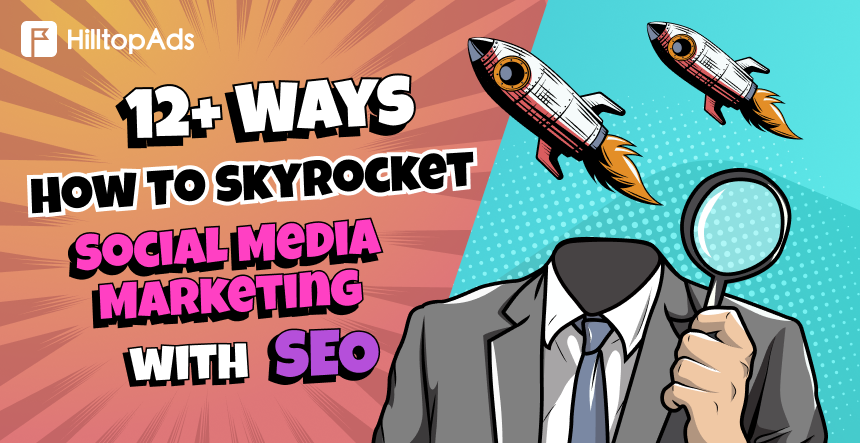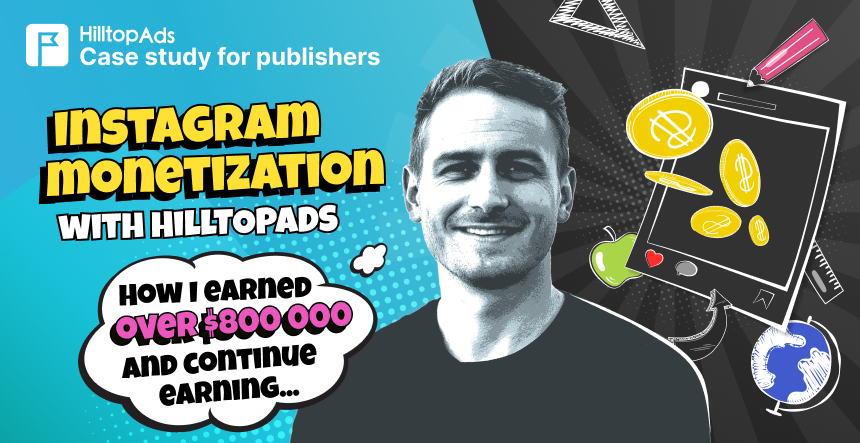Search engine optimization (SEO) focuses on optimizing your website’s content to achieve higher rankings in search results. As you know, social media marketing is about promoting your posts on platforms such as Instagram and Facebook to enhance engagement. By integrating social media with SEO, you can lure valuable traffic to your blog or monetization platform, greatly increasing your revenue. Today we will explore how to make these two strategies work together to enhance your website’s attractiveness.
Basics of Social Media SEO
Social media SEO has the same goal as website SEO — to get engagement from the ideal target audience; therefore, techniques used in both spheres are similar, and if you are familiar with the website SEO, it will be easier for you to dive into social media SEO.Let’s imagine a bit: you have a YouTube channel. Using effective SEO can help you draw in viewers and turn that audience into revenue. Many YouTubers use SEO strategies to increase their video traffic and monetize it. They earn money when viewers click on ads linked to their channel, which receives significant traffic. Additionally, social media traffic can be highly profitable if you approach it thoroughly.
Connection Between SEO and Social Media
SEO strategies include using relevant keywords in your posts, creating engaging meta descriptions and headlines that address users’ needs, using high-quality images with accurate descriptions, and implementing cross-linking, among other techniques. These strategies work hand in hand with social media promotion to enhance your brand engagement.Let’s get back to the YouTube channel example. When creating content for YouTube, it’s important to include relevant keywords in your video description and tags of your content. By researching the terms and phrases that your audience frequently searches for and including them in your description, you can increase the likelihood of your video being suggested when someone searches for those keywords.
SEO Helps Social Media
SEO techniques help your social media in a number of ways. They enhance the visibility and engagement of your social media pages. Incorporating relevant keywords and catchy titles strengthens your messaging across these platforms. Similar to how you would pursue backlinks for a website, obtaining mentions and tags for your social media accounts helps increase awareness and drive engagement. Additionally, optimizing your social media profile with pertinent information is an effective way to increase engagement.
Importance of Social Media
It can be hard to reach the top of the first search engine ranking page (SERP), as everyone is trying to get there as well. As said earlier, social media can skyrocket your positions. If you regularly post high-quality content on social media that leads your viewers to your website, then you create a positive loop where you climb up the search ranking, which causes your traffic volume to grow as well.
Well-written pieces of content mixed with SEO create a self-sustaining synergy, meaning you meet the requirements of web crawlers and please real users at the same time. Just don’t overdo it with keyword stuffing and maintain this delicate balance of UX vs. keywords.
Monitoring Social Media Interactions
Tracking social interactions provides essential SEO insights that influence digital marketing strategies. By examining ways users interact with content on social media, you can identify themes and interests that resonate with the audience, which helps shape future content plans and keyword research for search engine optimization.
Here’s a simple list of social media activities and what they mean to SEO:
- User interaction (likes, shares, comments, etc.) – enhances brand visibility
- Audience insight through engagement metrics – informs about keyword and content strategy
- Targeted social media campaigns – improve search engine relevance
Most Popular Social Media Platforms

Check out a few of the main social media platforms for you to tap into with a profile page to start generating traffic for your SEO-driven campaigns.
YouTube
YouTube videos often achieve high rankings in Google search results. Additionally, YouTube’s internal search engine is widely used, helping channels gain new viewers. By placing effective images, titles, and descriptions, you can significantly increase traffic to your YouTube channel, whether from Google searches or YouTube’s own search queries. YouTube is video-hosting, so keep in mind that you need to make sure that videos you make are high-quality and pleasing to watch.
Instagram is the ideal platform for scrolling through eye-catching photos and videos. Many brands use Instagram to connect with customers, and effective SEO strategies can make a difference. Selecting a suitable username and incorporating relevant keywords and locations in your bio can significantly enhance your page’s visibility, drawing more visitors to both your profile and website. Remember that the goal is to attract people via images, so make them appealing to your target audience.
Facebook is the leading social media platform, with over 3 billion active users. When users search for specific terms, the app recommends pages and profiles that match those keywords. To enhance engagement, any website or blog with a Facebook page should optimize its content. This involves incorporating popular keywords and discussing trending topics.
Keep your posts brief and to the point, use shortened links for easy recall, seek mentions from other pages, and leverage trending hashtags. Facebook also provides boosting services that can be used to make your page grow faster. Facebook is probably the most versatile platform of all. Its audience is wide and ready to soak up all kinds of content, so you can post images, videos, texts – everything, provided you meet the Meta moderation guidelines.
X
X is another popular social platform where internal search queries play a crucial role. To enhance visibility, brands on X can use SEO techniques such as posting about trending topics, again, choosing a catchy username, including trending hashtags in their posts, and integrating relevant keywords into their page bio. X specializes in text content, so you can write a little more information about your products there.
LinkedIn is a business-oriented social networking platform designed for professional engagement. Publishers can use LinkedIn to drive traffic to their websites, particularly those focused on business content. For instance, a finance news website can regularly post on LinkedIn to attract its target audience. As with other social platforms, success relies on using popular keywords, creating shareable and engaging content, seeking mentions from other pages, and discussing trending topics.
Elevate Social Media Profiles for Better SEO
As the digital landscape evolves, businesses must optimize their social media profiles to enhance their SEO. A well-designed profile serves as a strategic tool, incorporating relevant keywords that align with the brand’s core message and target audience.
By customizing URLs and aligning metadata across platforms, companies can create a unified marketing channel that improves search engine visibility. This integration of social media and SEO is essential for brands seeking a strong online presence and consistent messaging across all digital platforms.
Choose a high-quality profile picture and a username that is easy to find. Your bio should clearly describe your business and include a link to your website. Share announcements about new releases and updates on your social media, and engage with followers by responding to their comments. These practices help build long-term relationships with your audience.
Use Keywords in Profile Descriptions
Social media platforms with the appropriate keywords will not only increase your audience size but boost your search ranking as well. Strategically incorporating key search items into the description of the profile can make it more appealing to the algorithms, staying aesthetically pleasing for the viewers.
The more relevant keywords you put, the better. But remember that they should flow naturally, truly describing the topic of the content. No one likes inconsistency and irrelevant search results.
Create a Custom Website URLs
Being recognizable and memorable is the key when it comes to free traffic acquisition. Making a custom URL is the first step. It should be simple yet catchy for people to remember. Customizing URLs with brand-specific keywords creates a bridge that allows users to transition smoothly from social media to a brand’s main website.
These personalized URLs not only reinforce brand consistency but also improve memorability and searchability. This simple yet effective adjustment can enhance website recall for visitors, thereby strengthening online marketing efforts and clarifying the brand’s digital presence.
Add Social Share Features
This simple function is very effective as it allows your audience to share your content with their friends, colleagues, relatives, and acquaintances. This in turn boosts your brand awareness via good ol’ word of mouth.
Implement Backlinks
Backlinks are links from other websites that lead traffic to your site. Search engines value backlinks as they signify that your content is valuable enough for others to share with their audience. It’s beneficial to create backlinks from sites within your sphere through methods like backlink exchanges or guest posting.
Seek Online Mentions
Your social media presence is aimed at improving relationships with your audience. By getting mentions from other social media pages, your audience will start to notice you, and people will roll in like a snowball. When other creators tag or mention you, it lures new customers and viewers to your page. You can start by seeking mentions from people working in the same sphere as you do.
It is also important to know that when other social media pages recognize your content and recommend it to others, it makes you more reliable in the eyes of followers.
Collaborate With Social Media Influencers
Influencers, as you know, are people with significant social media followings and credibility in specific niches. They have considerable influence over purchasing decisions, making them valuable for promoting your brand. By partnering with influencers, you can generate excitement around your brand and cultivate lasting customer relationships.
These collaborations can take various forms, each aimed at maximizing link-building potential while aligning with a brand’s marketing goals:
- Sponsored content that fits both the influencer’s audience and the brand’s offerings.
- Co-hosted events or webinars that provide valuable insights, prompting participants to link back to the brand’s website.
- User-generated content campaigns that encourage followers to create content linking back to the brand, often with incentives.
As mentioned earlier, users tend to trust the people they watch. And if their favorite influencer says that they use your product, people will take their opinion for granted and start flowing onto your website to explore what you have to offer.
Mention Authors
Add a bio to your website for each author. This allows readers to learn about the author and their social media profiles while reading a post. The story of the author’s life enhances credibility and can improve your website’s search engine rankings.
Google considers E-E-A-T (Experience, Expertise, Authoritativeness, and Trustworthiness) when ranking sites. A comprehensive bio of the author signals to Google that the article is written by a trustworthy and knowledgeable source, which can result in better rankings.
Promote Yourself
You can buy ads on social media platforms, such as Instagram and Facebook. Choosing the right target audience will show the offer page to the people you seek for. Social media promotion can help you gain more loyal followers who will be interested in your products. As more people visit your social media page, they get directed to your website, increasing its traffic and reputation with search engines.
Apply for a Verification Badge
This little blue checkmark shows that you are credible and trustworthy. People who see it will be more likely to buy your products. Criteria for getting the badge can differ, but it is not that hard.

Make Social Media Page More Attractive
Every step we examined earlier is vital for SEO, but it is just a mechanism, bare gears with no visual casing. No follower would like to see blank posts and pictures, so here are some pieces of advice on how to make your page look prettier and gain more attention.
Simple Username
We said it many times already, but only because it is one of the pillars that holds everything. The username is the first thing that people will see on your page. It should be unique, easy to remember, simple to pronounce, and refer to the sphere you work in to make an association in followers’ minds.
High-Quality Profile Picture
The second thing a person sees on a page is the logo/picture of your brand. Everything we’ve said so far about the username is applicable here too. It shouldn’t be blurry or too detailed. Remember that on most social media platforms, profile pictures are very small, yet you should be able to understand what is depicted there.
Here are some typical resolutions for different platforms:
* Facebook: 170 × 170 pixels
* Instagram: 110 × 110 px
* X: 400 × 400 px
* TikTok: 20 × 20 px
* YouTube: 800 × 800 px
* LinkedIn: 400 × 400 px
Use the same profile picture on all social platforms, so people recognize you everywhere.
Descriptive Bio
Your social media bio should clearly describe what your page is about. It should be easy for anyone to understand your business at a glance. Tell your users about your company and what it does. Additionally, make sure to proofread for typos and grammatical errors to maintain a professional appearance. You should also mention necessary keywords and tags in the text, but make it seamless so it doesn’t bother the reader. Bio is also a great place to write a few words about your contact info; it will make you look more open to potential business partners.
Monetization via Social Traffic
After all the hard work, it is now time to properly monetize our social media pages and make profits. Here are some great ways to do that.
Affiliate Marketing
Affiliate marketing is about promoting products and earning commissions for each sale made through your recommendations. If you have a substantial following in your sphere, you can suggest products to your audience, providing compelling reasons why they are valuable. This can lead to conversions, allowing you to earn a commission for every sale generated. It’s one of the most effective ways to monetize your presence on Instagram.
Sponsored Posts
You can partner with brands to create sponsored content that highlights their products, which can take the form of photos, stories, long-form videos, or even texts. Many YouTube creators generate a significant portion of their income through sponsored content, such as a food blogger sharing a video funded by a brand of knives. Additionally, sponsored content plays a crucial role in Facebook monetization.
Display Ads
You can implement display ads on your website and use your social media profiles to direct traffic to that page. The key to success is to find an ad network that offers high-quality ads relevant to your target audience.
Direct Link
Direct Link is an effective ad format provided by HilltopAds ad network that enables you to monetize social traffic with ease. This format includes a pop ad feature, which activates when a user clicks on a designated element on your website. You have the flexibility to select what triggers the ad — whether it’s a click on a button, an image, or even a menu section.
Check out our case studies from publishers that monetize social traffic with HilltopAds successfully:
Conclusion
In conclusion, effectively combining SEO and social media strategies can significantly enhance your online presence and drive targeted traffic to your website. By leveraging the insights gained from social media analytics, optimizing content for relevant keywords, and fostering engagement through social channels, you can create a synergistic effect that boosts search engine rankings and increases brand visibility.
Emphasizing a cohesive approach that aligns both SEO and social media efforts not only improves overall digital marketing performance but also builds a stronger connection with the audience, ultimately leading to increased conversions and business growth. As the digital landscape continues to evolve, integrating these two powerful tools will remain essential for staying competitive and achieving long-term success.




















